R.J. Dent's Blog, page 9
September 29, 2022
Brushing The Soil Away: An Interview With R J Dent
September 29, 2022
R J DENT IN CONVERSATION WITH JOHN WISNIEWSKI
To honor National Translation Month, we are pleased to present an interview with the poet, novelist, translator, essayist and short-story writer, R J Dent.
 Created with GIMP
Created with GIMPJohn Wisniewski: R J, could you tell us about your new translation of Le Comte de Lautréamont’s The Songs of Maldoror? What was it like translating this classic?
R J Dent: I was a bit apprehensive when I started because Maldoror had such an impact on me when I first read it. A few years ago, someone said: “Once you’ve read Maldoror, you’ll never forget reading it – and you’ll never recover from reading it.” Having read it several times, and having now translated it, I agree with that.
Translating it was something of a tightrope-walking act; there were four English versions of Maldoror when I started translating it: Rodker’s (1924), Wernham’s (1943), Lykiard’s (1970) and Knight’s (1978). I had to thread my way between all four, using my own vocabulary and not their vocabularies, which wasn’t particularly difficult, as they all used quite old-fashioned language. Although Knight’s was the most recent translation, it was the one I liked the least, mostly because there was so much of Lautréamont’s actual text missing. When I translated The Songs of Maldoror, I tried to stay as close to Lautréamont’s original text as I could, but I also tried to translate the text so that it became the English text that Lautréamont might have written if he had written Maldoror in twenty-first century English.

John Wisniewski: Are there any particular authors that you like?
R J Dent: Yes. I tend to gravitate to French authors – Pascale Petit, Philippe Djian, Gustave Flaubert, Jean Genet, Georges Bataille – they seem to be able to write about sex and death in a way that the English can’t. French fiction has a psychological depth that’s absent from many English stories. There are exceptions, and there are English authors whose works I enjoy reading: Angela Carter, J.G. Ballard and Anthony Burgess spring to mind. I also enjoy reading Jeremy Reed’s poetry and prose. He has a way of writing that’s totally different to how anyone else writes. I like some American authors too: William S. Burroughs and Cormac McCarthy particularly.
John Wisniewski: When did you begin writing?
R J Dent: I started writing when I was twelve years old. I wrote my first poem then. Then, after spending a few years learning to write properly, I started writing seriously and publishing in 1998 – poems and short stories to start with, and a few essays. In 2005, I had seventy poems and fifteen short stories published and knew I was on the cusp of a career. Then I wrote a novel, Myth, published in 2006. After that I started translating. The Flowers of Evil was my first full-length translation of a French classic. It was only a matter of time before I attempted translating The Songs of Maldoror.
John Wisniewski: What was the experience of translating Baudelaire’s The Flowers of Evil like?
R J Dent: My own translation of The Flowers of Evil came out of my frustration with one particular English translation. I was studying Baudelaire at university and the set text was a bilingual edition of The Flowers of Evil. I soon realised that the English “versions” were not even close to the French originals. So I started to translate a few of the poems myself, just to see if I could get a sense of what Baudelaire was actually saying. If I may use an analogy, the translation process was a bit like a facet of archaeology, in that I had a valuable artefact, buried in the soil, and my job, as a translator was to gently brush the soil away until the object was totally uncovered, and could stand there, in another era, pristine and perfect.
To use another analogy, the process involved a form of time travel – I would go back to nineteenth century Paris, and absorb the sights, sounds, smells and textures of whatever was being described. I would then bring that French description back into the present day, having transformed it into twenty-first century English. Those analogies both apply to the process of translating The Songs of Maldoror too. I imaginatively visited the places described so vividly by Lautréamont, and then I brought them back from nineteenth-century France and described them in modern English.
John Wisniewski: Could you tell us about your horror novel, Myth . What inspired you to write it?
R J Dent: As well as French fiction, I love Greek stories, tales, myths, dramas and the few Greek novels that were written years ago – Daphnis and Chloe by Longus being a particular favourite. After I read Robert Graves’ comment about Greek myths having regional variations throughout Greece, I wrote a novel in which English tourists encounter an aspect of a dangerous Greek myth. The myth manifests itself in a way the protagonists had not considered and, as with all myths, it has a devastating and destructive impact. I knew that all myths were metaphors for things that had actually happened, so the novel’s mantra was: every myth is based on a terrible truth, which became the tagline of the promotional poster. Essentially, I rewrote the Bellerophon and chimera myth, setting it on a Greek island in the twenty-first century. Myth is a horror/fantasy novel, and although there’s a lot of graphic violence and sex in it, it was a great deal of fun to write. Ultimately, it prepared me for the horrors I encountered in The Songs of Maldoror.
John Wisniewski: You have also translated the writing of Alfred Jarry. What was that like?
R J Dent: I translated Alfred Jarry’s Speculations into English for the editor of Black Scat Books at his request. He’s a huge Jarry fan and was quite persuasive, so I accepted the job. I’m very pleased with the resulting book. Jarry’s not easy to translate because of the surrealism of his humour – it’s tricky to catch his tone and convey it accurately. However, I’ve had quite a bit of positive feedback, so I think I succeeded.
John Wisniewski: You have also translated the writings of Marquis de Sade. What was the experience like?
R J Dent: Again, he was an author that interested me as a translator. I started with his Last Will and Testament because it’s an important historical document. That was published by Philosophy Now. I then translated a few of Sade’s stories, including Retaliation and The Self-Made Cuckold, both published by New Urge Editions. After that, I translated Sade’s book-length essay, Some Thoughts on the Novel for Oneiros Books. Every so often, I go back to Sade and translate something else. He’s a very interesting writer. A moralist too, surprisingly.
John Wisniewski: How do you choose the written works you will translate?
R J Dent: I only take on translation projects that interest me, by which I mean either authors or books that interest me. That’s it. So far, I’ve translated some very interesting and important authors, including Alfred Jarry, Alcaeus, Charles Baudelaire, the Marquis de Sade, Antonin Artaud, Arthur Rimbaud, Louis Aragon, Georges Bataille, and obviously, Le Comte de Lautréamont.
John Wisniewski: R J, I’d like to talk a little more about your translation of The Songs of Maldoror. It’s published by Infinity Land Press and due out on 1st October, this year. Could you tell us what is different about your translation of The Songs of Maldoror to any other version of it?
R J Dent: The main difference between my translation of Lautréamont’s classic and other versions is the language I use. I’ve brought The Songs of Maldoror into the twenty-first century for English readers. As for the book itself, that is very different to every preceding edition of Maldoror. Infinity Land Press has made it into something far beyond my expectations. For a start, it’s an illustrated hardback edition, with full colour illustrations created by photographer Karolina Urbaniak. Her illustrations are very dark and very confrontational and they complement Lautréamont’s transgressive text perfectly. There are 37 illustrations throughout, including the cover, which gives an indication of the type of image you’ll see inside the book. Also, the avant-garde writer, Audrey Szasz has written a thought-provoking Foreword to the book, and the poet Jeremy Reed has written an Afterword that is an in-depth look at Lautréamont’s life and death. So The Songs of Maldoror that Infinity Land Press is publishing and launching on 1st October this year is a multi-media artefact, a hardback, illustrated, subterranean literary classic, bookended by two insightful essays written by two of today’s most relevant and exciting writers.
John Wisniewski: Any future plans and projects, R J ?
R J Dent: Yes, there are lots of projects; some completed, some with publishers, some just started, some waiting to be started. But unfortunately, I’m not going to talk about any of them. I don’t like to talk about them while I bring them to completion, as I feel it dissipates their energy. However, I’m very happy to discuss projects once they’re in book form because then people can see and read what I’m talking about.
The online version of this interview, published in Great Weather for Media is available here:
https://www.greatweatherformedia.com/greatweatherformediacom/2022/9/27/an-interview-with-rj-dent
Posted 8 minutes ago
September 10, 2022
The Songs of Maldoror
Translated into English by R J Dent

Written between 1868 and 1869 by Le Comte de Lautréamont, the pseudonym of Isidore Ducasse, The Songs of Maldoror was discovered by the Surrealists and hailed as a dark progenitor of their movement.
This new version of Lautréamont’s influential masterpiece is translated into modern English by R J Dent and is published by Infinity Land Press on 1st October 2022.
The Songs of Maldoror is illustrated throughout with Karolina Urbaniak’s savagely beautiful illustrations. It has a Foreword by Audrey Szasz and an Afterword by Jeremy Reed.
Title: The Songs of Maldoror
Author: Le Comte de Lautréamont
Translator: R J Dent
Illustrator: Karolina Urbaniak
Foreword: Audrey Szasz
Afterword: Jeremy Reed
Publisher: Infinity Land Press
ISBN: 978-1-8382803-7-6
Format: Hardback
Pages: 294
Language: English
R J Dent: http://www.rjdent.com/
Infinity Land Press: https://www.infinitylandpress.com/
August 15, 2022
Book Launch – The Songs of Maldoror
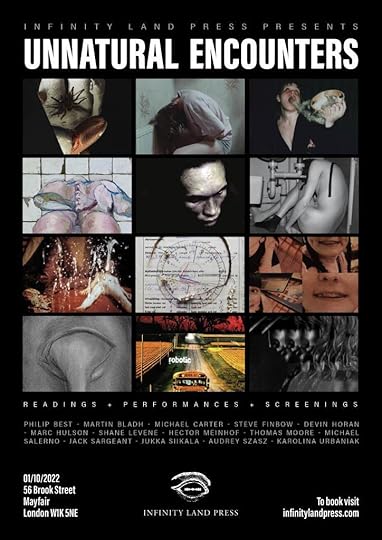 R J Dent is launching his new English translation of The Songs of Maldoror, illustrated by Karolina Urbaniak, with an introduction by Jeremy Reed and a foreword by Audrey Szasz, at the Infinity Land Press multimedia event – Unnatural Encounters – at 56 Brook Street, Mayfair, London W1K 5NE, on Saturday, 1st October, 2022.
R J Dent is launching his new English translation of The Songs of Maldoror, illustrated by Karolina Urbaniak, with an introduction by Jeremy Reed and a foreword by Audrey Szasz, at the Infinity Land Press multimedia event – Unnatural Encounters – at 56 Brook Street, Mayfair, London W1K 5NE, on Saturday, 1st October, 2022.The line-up includes performances, launches, exhibitions, screenings and readings from some of the most dangerous, challenging and confrontational writers, artists, musicians and performance artists working today.
Event details:
Doors open 15:00
Event starts 16:00
MICHAEL SALERNO (film screening with an introduction)
Break
HECTOR MEINHOF (performance)
STEVE FINBOW (reading)
RJ DENT & KAROLINA URBANIAK (THE SONGS OF MALDOROR book launch/reading + multimedia)
AUDREY SZASZ(reading)
Break
MARTIN BLADH (DES book launch/performance)
SHANE LEVENE (reading)
THOMAS MOORE (guest reading)
PHILIP BEST (reading)
Break
JUKKA SIIKALA (film screening with an introduction)
JACK SARGEANT (reading)
DEVIN HORAN (film screening)
Event ends
Doors close 23:00
Tickets are available from the Infinity Land Press website at this link: https://www.infinitylandpress.com/product-page/unnatural-encounters-event
July 6, 2022
Infinity Land Press Multi-Media Event – 1st October 2022

Infinity Land Press has arranged a multi-media event in a spacious and conveniently-located venue in Mayfair, London.

The event will take place on the 1st of October 2022, and will begin with a book sale and an art exhibition, followed by an evening of readings, screenings, book launches and performances.

So far, there are confirmed appearances by: Audrey Szasz, Philip Best, Jukka Siikala, Jack Sargeant, Steve Finbow, Michael Salerno, R J Dent, Thomas Moore (guest author), Martin Blahd and Karolina Urbaniak.
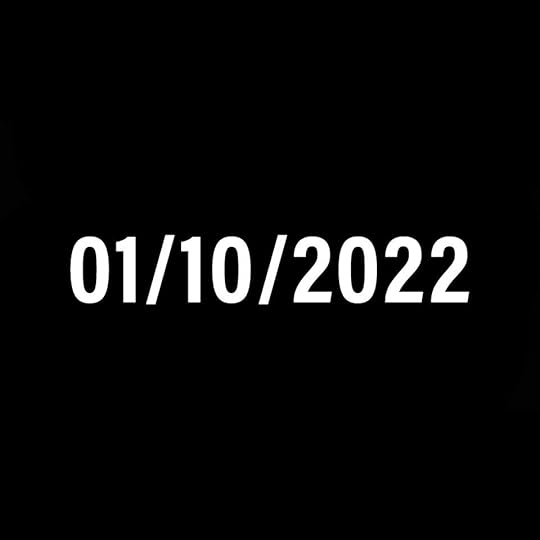 https://www.infinitylandpress.com/
https://www.infinitylandpress.com/
March 23, 2022
Alfred Jarry’s Speculations, translated from the French by R J Dent
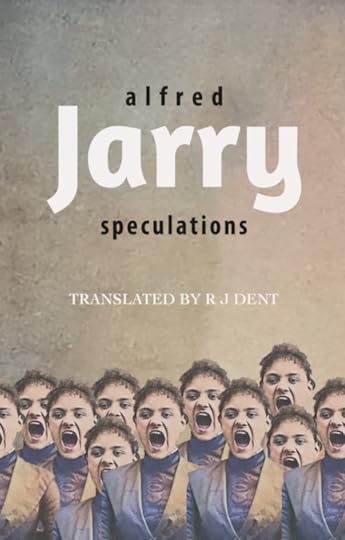


Alfred Jarry spent his brief and turbulent life experimenting with genres of fiction. In his last few years, he created a new fictional form: the absurdist speculative essay. R J Dent’s new English translation of Speculations contains 68 of Jarry’s essays, originally printed between 1901 and 1904 as a series, ‘Spéculations’, in the French journal Le Revue Blanche.
In Jarry’s darkly comic collection of surrealist and satirical prose pieces, the renowned author deploys his characteristic satirical eye and dark humour to devastating effect. These essays range in tone from the wildly comic to the deeply tragic and cover a diversity of subjects, ranging from French Trees to Cannibalism. For Jarry, nothing is sacred; everything is worthy material for his surreal satire; the Passion is presented as a sporting event; buses are the prey of big game hunters, and even the Queen is licked from behind.
Book details: https://blackscatbooks.com/2022/03/23/jarry-lives/
Available in the UK here: https://www.amazon.co.uk/dp/B09W78YV4G
And in the USA here: https://www.amazon.com/dp/B09W78YV4G
February 5, 2022
Charles Baudelaire – Selected Erotic Poems – A Review by Amanda Hodgson
Selected Erotic Poems
Charles Baudelaire
Translated from the French by RJ Dent

The Godfather of Gloom, Charles Baudelaire, gets the R J Dent treatment in a translation that brings new life and suppleness to his words.
Baudelaire is closed curtains in daytime, candles, overflowing ashtrays and small, intimate parties where small, intimate events occur; as in these closing lines from “Jewels”:
‘And as the candle-light prepared to die,
and its low flames gently lit the chamber,
each time there sounded a contented sigh,
our warm flesh blushed the colour of amber.’
Ennui-ridden existentialist Baudelaire gives us some dreamy transporting moments before we are mired in the sludge of sin once more. This is starkly drawn in ‘I love the memory’, where an Elysium in which ‘no shame was caused by sensuality’, men and women were naked and ‘heaven lovingly caressed their skin’ is firmly of the past. In trying to imagine such times in the present ‘a cold and gloomy feeling envelopes his soul’. It sounds more than cold and gloom. Cold and gloom is Britain pre-global warming most days. Cold and gloom is not
‘a black, terrifying tableau:
monstrosities crying out for their clothes;
twisted bodies, fat uglies needing masks,
the crooked, wasted, flabby, the grotesque –
who some practical god, serene and calm,
forced into metal clothes when they were born,
and every one as pale as candle wax,
who gnaw at their debauchery and sex
who drag with them their parents’ stupid vice
of bringing hideous progeny to life.’
The reader can feel the sun and smell the tamarind in ‘Exotic Perfume”, where Baudelaire is once more transported from the bleak present by a woman’s body. Baudelaire portrays women as representing good and evil on a metaphysical plane. I am filled with ennui over Madonna/Whore tropes, but the imagery delights.
In “Hair” the woman of the poem is the sea. The poet dives in:
‘Into this black sea where other seas swell,
I’ll dip my lovingly rapturous head
and then, caressed by rolling waves, I will
find you again, idleness that’s fertile
enough to lull me into a sweet bed.’
There is much to delight in this translation. The rich, evocative imagery lends these poems to being read on silken bedding while languorously consuming peeled grapes. This translation serves as both introduction and companion to the works of Charles Baudelaire.
Charles Baudelaire – Selected Erotic Poems
Translated into English by R J Dent
Published by New Urge Editions
R J Dent’s official website book details and links:
New Urge Editions book details and links:
https://blackscatbooks.com/2021/11/14/banned-in-france/November 26, 2021
Jean-Fucque (Le Cocque) – Adapted by R J Dent from a Story by Louis Aragon
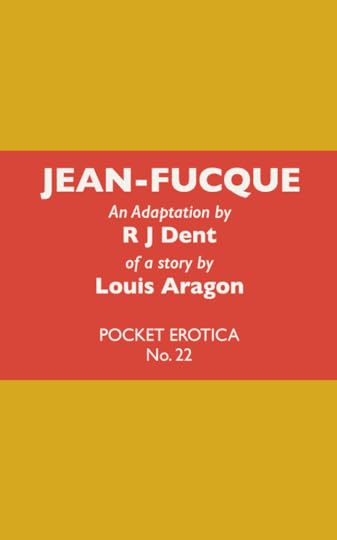
A BORN-AGAIN SURREALIST CLASSIC
Watch out! – Here comes Jean-Fucque (Le Cocque).
Inspired by & loosely adapted from Louis Aragon’s obscure surrealist text, R J Dent’s 21st century rendition is an absurdist tale of Jean-Fucque Le Cocque, a large, disembodied penis and his Parisian adventures, including his satisfactory encounters with female passengers on the Metro, his small room in a hotel frequented by prostitutes, and his reason for buying a hat.
This is No. 22 in the Pocket Erotica series.
Product Details:
Publisher: New Urge / Pocket Erotica
Publication Date: November 24, 2021
Language: English
Format: Paperback
Pages: 131
ISBN-10: 1737943042
ISBN-13: 978-1737943044
Item Weight: 5 ounces (141.74 grams)
Item Dimensions: 4 x 0.33 x 6 inches (10.16 x 0.84 x 15.24 cm)
A description of the book and purchase links via the publisher can be found here
To buy at Amazon.com, the link is here
To buy at Amazon.co.uk, the link is here
R J Dent’s official website is here
November 15, 2021
Charles Baudelaire’s Selected Erotic Poems, translated from the French by R J Dent

Charles Baudelaire’s decadent erotic poems caused a scandal when they first appeared in 1857. Both author and publisher were prosecuted for unveiling works that were ‘an insult to public decency’, and six poems in the collection were suppressed.
These so-called indecent works (banned in France until 1949) were: Lesbos; Condemned Women: Delphine and Hippolyta; Lethe; To One Who Is Too Happy; Jewels; and The Metamorphosis of the Vampire— and all are included in this Pocket Erotica edition, plus 20 more.
Selected Erotic Poems
Charles Baudelaire
Translated from the French by R J Dent
Pocket Erotica No. 21, New Urge Editions
ISBN 978-1737943037
Format: Paperback chapbook
Pages: 64
Charles Baudelaire’s Selected Erotic Poems is available here
Details are available here
November 6, 2021
The Self-Made Cuckold by the Marquis de Sade

The Self-Made Cuckold
The Marquis de Sade
Translated into English by R J Dent
The Marquis de Sade’s The Self-Made Cuckold, translated from the French by R J Dent, is a rare work sans the notorious content Sade is infamous for. Indeed, it contains no savagely violent orgies nor flagellation. This little gem is — by comparison to The 120 Days of Sodom — libertine light and amusingly smutty. There is also a strain of feminism running through the book.
R J Dent’s brand-new English translation of the Marquis de Sade’s The Self-Made Cuckold, written by Sade when he was a prisoner in the Bastille in 1788, is now available as a paperback chapbook as #20 in the Pocket Erotica Series from New Urge Editions.
Product details:
Title: The Self-Made Cuckold
Author: the Marquis de Sade (D.A.F. de Sade)
Translator: R J Dent
Publisher: Pocket Erotica/New Urge Editions/Black Scat Books
Publication Date: November 2021
Format: Paperback
Pages: 60
Dimensions: 6” x 4” x 0.15” (15.24cm x 10.16 x 0.381cm)
Weight: 3.2 ounces (90.7185 grams)
Language: English
ISBN-13: 978-1737371199
ISBN-10: 1737371197
The Self-Made Cuckold is available from New Urge Editions here: SADE STRIKES AGAIN
or from Amazon.com here: https://www.amazon.com/dp/1737371197
or from Amazon.co.uk here: https://www.amazon.co.uk/Self-Made-Cuckold-Marquis-Sade/dp/1737371197/ref=monarch_sidesheet
October 24, 2021
Some Thoughts on the Novel by the Marquis de Sade

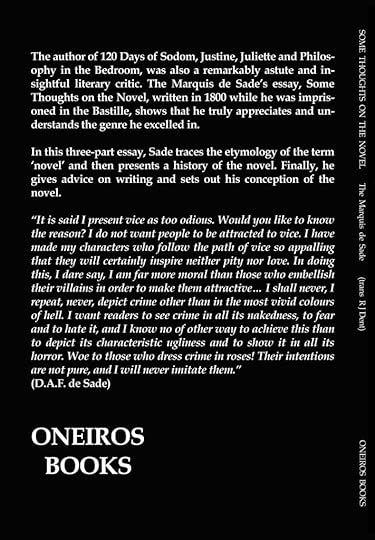
R J Dent’s modern English translation of the Marquis de Sade’s insightful and thought-provoking essay on literature and writing is now available in a bilingual edition from Oneiros Books.
Product details:
Title: Some Thoughts on the Novel
Author: the Marquis de Sade (D.A.F. de Sade)
Translator: R J Dent
Publisher: Oneiros Books
Format: Paperback
Pages: 112
Dimensions: 9” x 6” (23cm x 15cm)
Language: English and French (bilingual edition)
ISBN: 978-1-4717-9695-1
Some Thoughts on the Novel is available from Oneiros Books at: https://blackwormmedia.co.uk/phantasms?fbclid=IwAR28mgauI7VHnQ42mOOhfTAQSJv9MjjEMOki8eT-9L1ZZbTFvDTijRm3Fas
R J Dent’s website is at www.rjdent.com



